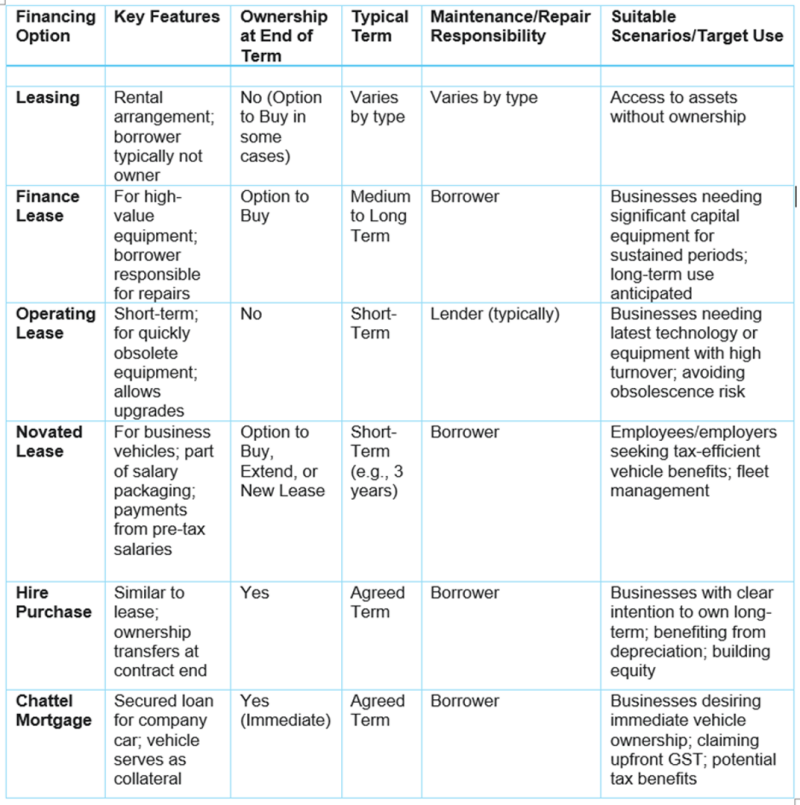
Financing What Matters.
We facilitate Bespoke Funding Solutions for improving your Business Operations to Strategic Growth.
Types of Assets Financed by FoS.
Overview of FoS Asset Financing Options.
Funding of Solutions Pty Ltd offer a range of asset financing options tailored to different business needs and asset types.
The selection of an appropriate financing option is a strategic business decision, often influenced by factors such as ownership objectives, tax implications, and the asset's susceptibility to obsolescence.
Funding of Solutions provides flexible capital for the assets that keep your business running and growing.
Whether you're upgrading equipment, expanding infrastructure, or investing in new capabilities, our financing solutions are designed to support both immediate operational needs and long-term strategic goals. Let us help you turn potential into performance.
Our Group possesses the capability to finance a wide array of assets, which are indispensable for both the day-to-day operations and the strategic expansion of businesses. Our financing scope is extensive and includes, but not limited to, the following specific types of assets:
• Technology:
This broad category encompasses various technological tools and systems that are essential for modern business operations, ranging from software licenses to specialised IT infrastructure.
• Business vehicles:
This includes a diverse range of vehicles, from commercial vans vital for logistics and delivery to company cars crucial for sales and operational mobility.
• Office equipment:
Essential items such as computers, printers, specialised office machinery, and communication systems fall under this category, supporting administrative and operational functions.
• Operational machinery:
This covers heavy equipment and specialised machinery directly utilised in the production of goods or the delivery of services across various industries, such as manufacturing, construction, and agriculture.
• Shop fitouts:
Financing is available for the structural and aesthetic components required to establish or renovate retail and commercial spaces, including fixtures, fittings, and interior design elements.
• Commercial real estate:
FoS 's capacity to finance properties used for business purposes, such as office buildings, warehouses, retail outlets, or industrial facilities, representing significant long-term investments.
• Business expansions:
We provide financing for holistic growth initiatives that may involve multiple asset types or strategic investments beyond individual equipment purchases, such as funding a new branch, a significant product line expansion, or a large-scale project.
FoS is not solely focused on facilitating the acquisition of tangible, depreciating assets. Instead, we position ourselves to support broader strategic growth initiatives and significant capital investments that are foundational to a business's long-term trajectory.
This comprehensive scope means a single client could potentially utilise FoS for multiple, diverse financing needs throughout their business lifecycle, from acquiring operational machinery to funding a new facility or a major growth project.
This capability enhances client retention and expands FoS 's market reach beyond niche equipment financing, positioning us as a versatile and comprehensive business finance partner.
FoS is committed to offering competitive rates and flexible financing options designed to meet the diverse needs of businesses of any size, with adaptable repayment terms to help manage budgets effectively.
Leasing
Leasing contracts are fundamentally rental arrangements where the borrower typically does not assume ownership of the financed asset during the lease term. However, some lease agreements may include an option to purchase the asset at the conclusion of the contract.
Finance Leases
Finance leases are commonly used for high-value equipment and assets, typically spanning medium to long terms. A key characteristic of this arrangement is that the borrower is generally responsible for all repairs and maintenance of the asset throughout the lease term, mirroring the responsibilities associated with direct ownership. These leases are ideal for businesses requiring significant capital equipment for sustained periods where long-term use is anticipated. They are particularly beneficial when a business needs to utilize an asset without the immediate burden of outright ownership or managing a large upfront capital expenditure, while still bearing the operational responsibilities.
Operating Leases
Operating leases are typically short-term agreements, specifically designed for equipment or assets that may rapidly become obsolete due to swift technological advancements or evolving market demands. A significant advantage of operating leases is the inherent flexibility they provide, allowing for convenient upgrading of equipment or assets. This is a crucial feature that is generally not feasible with a finance lease. These leases are best suited for businesses that need access to the latest technology or equipment with high turnover rates, such as in IT, construction, or manufacturing. They enable companies to mitigate the risks of obsolescence and maintain a competitive advantage through regular equipment upgrades without the long-term commitment of ownership.
Novated Leases
Novated leases are specifically structured for business vehicles and are often integrated as a component of a comprehensive salary packaging arrangement for employees. A primary benefit is that lease payments are deducted from an employee's pre-tax salary. This arrangement can effectively reduce an individual's taxable income, offering a significant financial advantage. These are typically short-term arrangements, often spanning around three years. At the end of the lease term, the lessee generally has flexible options: to purchase the vehicle, extend the current lease, or enter into a new lease for a different vehicle. These leases are highly beneficial for both employees and employers seeking to provide vehicle benefits with optimal tax efficiency, particularly relevant for businesses with vehicle fleets or those offering car allowances as part of their remuneration packages.
Hire Purchase Agreements
Hire purchase agreements share structural similarities with leases in their payment arrangements, but they fundamentally differ in terms of ownership. A key characteristic is that ownership of the equipment or asset is explicitly transferred to the business upon the successful conclusion of the contract.
Over the course of the agreement, the borrower is committed to paying the full purchase price for the asset or equipment, in addition to accrued interest, over the agreed term.
This option is appropriate for businesses that have a clear intention to own the asset long-term, wish to benefit from asset depreciation for tax purposes, and have a sustained need for the asset beyond the repayment period. It is often preferred when the asset has a long useful life and the business aims to build equity on its balance sheet.
Chattel Mortgages
A chattel mortgage is a specific type of secured loan, almost exclusively utilized for financing a company car or business vehicle. In this arrangement, the vehicle itself directly serves as the loan collateral, meaning the loan is secured against the asset being financed.
A critical aspect of this agreement is that if the borrower defaults on payments, the lender retains the legal right to reclaim and sell the vehicle to recover the outstanding costs of the loan. Chattel mortgages are commonly utilized by businesses that desire immediate ownership of a vehicle, can claim the Goods and Services Tax (GST) on the purchase price upfront, and prefer a loan structure where the asset itself provides security. This option is often chosen for its potential tax benefits related to interest payments and asset depreciation.
The choice among these financing options represents a strategic decision for businesses, driven by their specific goals regarding asset ownership and the asset's susceptibility to obsolescence.
For instance, operating leases are explicitly designed for equipment that may quickly become obsolete, offering flexibility for upgrades. This contrasts sharply with finance leases, which are suited for high-value equipment with a longer intended use, where the borrower manages maintenance.
Hire purchase and chattel mortgages, on the other hand, lead to eventual or immediate ownership, allowing businesses to build equity and potentially leverage tax benefits associated with asset depreciation.
This demonstrates that FoS provides solutions that cater to various asset lifecycle management strategies and diverse business priorities, extending beyond just immediate funding needs.
Comparative Table of Asset Financing Options


